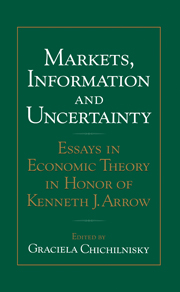Book contents
- Frontmatter
- Contents
- Preface
- List of contributors
- Section I Information and markets
- Section II Uncertainty and finance
- Section III Market externalities and justice
- 8 Moral hazard and independent income in a modern intertemporal-equilibrium model of involuntary unemployment and mandatory retirement
- 9 On the optimal schedule for introducing a new technology, when there is learning by doing
- 10 Price and market share dynamics in network industries
- 11 Exchange in a network of trading posts
- 12 Equilibrium market formation causes missing markets
- 13 Toward a general theory of social overhead capital
- 14 On population externalities and the social rate of discount
- 15 Trade and Welfare
- 16 History as a widespread externality in some Arrow–Debreu market games
- 17 Redistribution by a representative democracy and distributive justice under uncertainty
- Author index
- Subject index
15 - Trade and Welfare
Published online by Cambridge University Press: 05 December 2011
- Frontmatter
- Contents
- Preface
- List of contributors
- Section I Information and markets
- Section II Uncertainty and finance
- Section III Market externalities and justice
- 8 Moral hazard and independent income in a modern intertemporal-equilibrium model of involuntary unemployment and mandatory retirement
- 9 On the optimal schedule for introducing a new technology, when there is learning by doing
- 10 Price and market share dynamics in network industries
- 11 Exchange in a network of trading posts
- 12 Equilibrium market formation causes missing markets
- 13 Toward a general theory of social overhead capital
- 14 On population externalities and the social rate of discount
- 15 Trade and Welfare
- 16 History as a widespread externality in some Arrow–Debreu market games
- 17 Redistribution by a representative democracy and distributive justice under uncertainty
- Author index
- Subject index
Summary
The argument for international trade is that in a competitive equilibrium with trade all individuals gain in utility, compared to domestic autarky.
Ever since the modern formulation of gains from trade by Samuelson (1939) and the identification of competitive equilibrium allocations with Pareto optimal allocations by Arrow (1951), it has been recognized that the argument requires transfers across individuals. In a world economy which consists of many countries, and in which each country is a collection of possibly heterogeneous individuals, domestic autarky refers to a competitive equilibrium allocation of each country in isolation, though not of each individual in isolation. A competitive allocation with trade across countries need not entail an improvement in the utility of every individual.
Transfers of commodities or revenue balance across individuals. Domestic transfers balance across individuals within each country. They are thus a restricted class of transfers of evident interest for policy.
Are domestic transfers sufficient for Pareto gains from trade? An affirmative answer was given by Grandmont and McFadden (1972). Consider a competitive equilibrium allocation for each country, the autarkic allocation, and a competitive equilibrium allocation for the world economy obtained after the domestic reallocation of commodities associated with the autarkic allocation. By a revealed preference argument, each individual is at least as well off in this competitive equilibrium allocation for the world economy as in autarky. Evaluating the domestic reallocation of commodities at the competitive equilibrium prices for the world economy determines domestic transfers of revenue sufficient for Pareto gains from trade.
- Type
- Chapter
- Information
- Markets, Information and UncertaintyEssays in Economic Theory in Honor of Kenneth J. Arrow, pp. 322 - 327Publisher: Cambridge University PressPrint publication year: 1999



